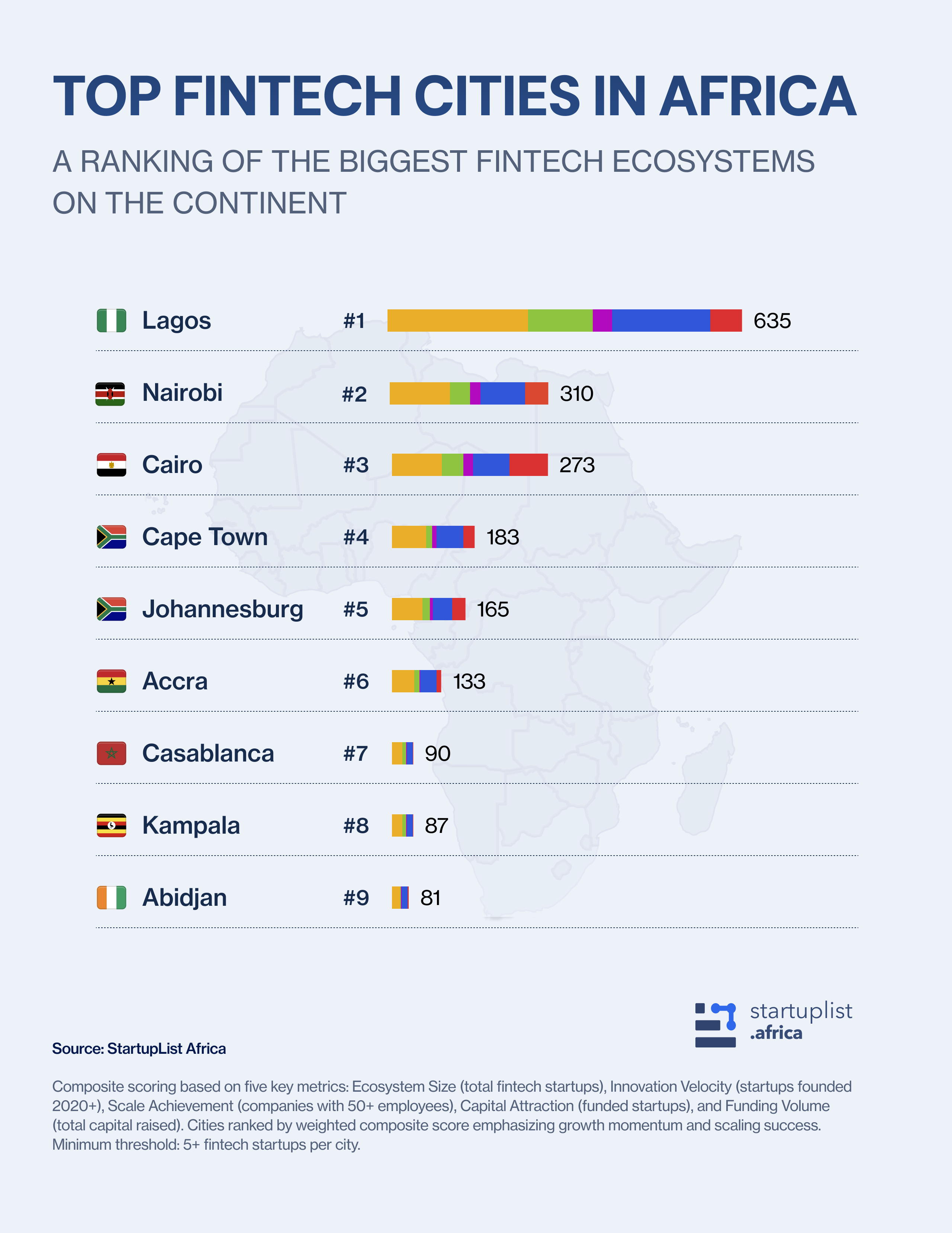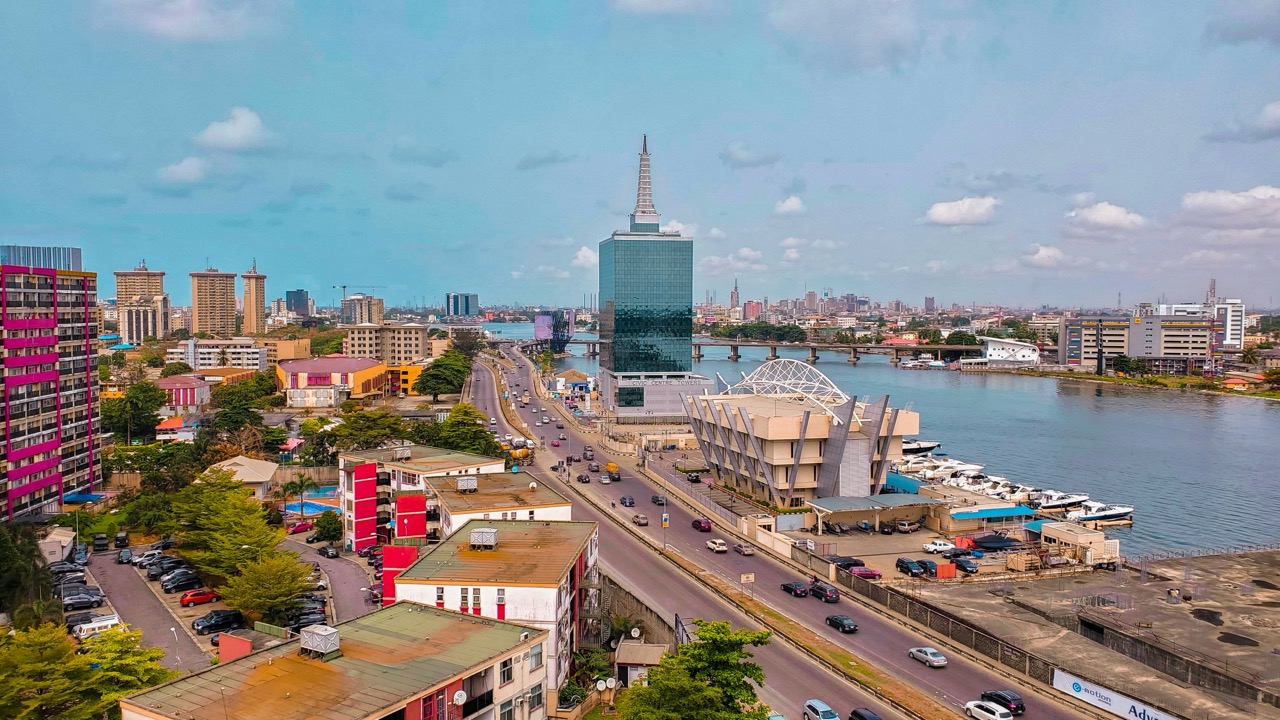Africa’s fintech landscape has evolved into a sophisticated ecosystem of innovation, with certain cities emerging as undisputed leaders. Our latest analysis of over 1,300 fintech startups across the continent reveals the true scale and distribution of this financial technology revolution.

Source: StartupList Africa
The Continental Leaders
Based on comprehensive data analysis, these nine cities represent Africa’s most dynamic fintech ecosystems:
- Lagos, Nigeria — 503 startups
- Nairobi, Kenya — 210 startups
- Cairo, Egypt — 194 startups
- Cape Town, South Africa — 118 startups
- Johannesburg, South Africa — 104 startups
- Accra, Ghana — 75 startups
- Casablanca, Morocco — 35 startups
- Abidjan, Côte d’Ivoire — 33 startups
- Kampala, Uganda — 32 startups
Loading chart...
Lagos: The Undisputed Champion
Lagos stands as Africa’s fintech capital with 503 active startups, more than double its nearest competitor. The city’s ecosystem demonstrates remarkable depth:
- 256 startups founded since 2020, showing sustained innovation momentum
- 78 companies with 50+ employees, indicating mature scaling capabilities
- 116 funded startups with $6.03 billion in total funding
- Strong regulatory support through Nigeria’s Central Bank sandbox framework
This concentration of talent, capital, and regulatory backing has created a self-reinforcing cycle that continues to attract entrepreneurs and investors from across the continent.
East Africa’s Fintech Hub: Nairobi
Nairobi secures its position as East Africa’s fintech leader with 210 startups. Kenya’s pioneering role in mobile money has created fertile ground for continued innovation:
- 77 new startups since 2020, demonstrating ongoing entrepreneurial activity
- 41 companies with 50+ employees, showing strong scaling success
- 59 funded startups with $4.64 billion in total funding
- Deep mobile money penetration providing infrastructure foundation
The city benefits from Kenya’s progressive fintech regulations and a mature mobile payments ecosystem that serves as a testing ground for new financial services.
Cairo’s Capital Advantage
Cairo ranks third with 194 startups, but leads in funding concentration with $10.07 billion raised across 49 funded companies. This represents the highest average funding per startup among major African fintech hubs:
- 91 startups founded since 2020, indicating strong recent growth
- 50 companies with 50+ employees, matching Nairobi’s scaling success
- Access to both regional and international capital markets
- Strategic position connecting Africa with Middle Eastern investors
Southern Africa’s Financial Services Heritage
Cape Town and Johannesburg leverage South Africa’s established financial sector:
Cape Town (118 startups):
- 27 companies with 50+ employees
- $2.95 billion in total funding across 35 funded startups
- Strong university ecosystem supporting talent development
Johannesburg (104 startups):
- 11 companies with 50+ employees
- $3.81 billion in total funding across 26 funded startups
- Corporate partnership opportunities with traditional banks
West Africa’s Emerging Centers
Accra has established itself as West Africa’s second fintech hub with 75 startups, benefiting from Ghana’s interoperability regulations and growing digital adoption. The city has attracted $1.66 billion in funding across 22 funded startups.
Abidjan represents Francophone Africa’s fintech potential with 33 startups and $264 million in funding, supported by Côte d’Ivoire’s new startup legislation offering tax incentives.
North and East African Expansion
Casablanca serves as a gateway between Africa and Europe with 35 startups and $152 million in funding, while Kampala builds on Uganda’s high mobile money penetration with 32 startups and $212 million raised.
Key Market Insights
Innovation Momentum
Post-2020 startup formation reveals where innovation is accelerating:
- Lagos: 256 new startups (51% of total)
- Cairo: 91 new startups (47% of total)
- Nairobi: 77 new startups (37% of total)
Scaling Success
Cities with the most companies achieving 50+ employees:
- Lagos: 78 companies
- Cairo: 50 companies
- Nairobi: 41 companies
- Cape Town: 27 companies
Funding Distribution
Total funding by city shows capital concentration patterns:
- Cairo: $10.07 billion (highest per startup average)
- Lagos: $6.03 billion (largest absolute amount)
- Nairobi: $4.64 billion
- Johannesburg: $3.81 billion
Loading chart...
Loading chart...
Deep Market Analysis
The Innovation-Scaling Paradox
Our ecosystem maturity analysis reveals a fascinating paradox: cities with the highest innovation rates (new startup formation) don’t necessarily excel at scaling. Casablanca leads in innovation rate at 44.6% of startups founded since 2020, yet has limited scaling success. This suggests emerging ecosystems are in rapid formation phases but lack the infrastructure for sustainable growth.
Lagos, while having a moderate innovation rate of 40.9%, demonstrates superior scaling capabilities with 4.2% of startups achieving 50+ employees—the highest rate among major hubs. This indicates a mature ecosystem with established support networks for growth.
Funding Cycle Dynamics
The funding trends reveal distinct market cycles:
- 2018-2020: Foundation period with steady, modest funding
- 2021-2022: Boom period with dramatic funding surges across all cities
- 2023: Market correction with selective mega-rounds (Cairo’s $5.7B peak)
- 2024-2025: Stabilization with renewed growth in select markets
Cairo’s funding volatility—from $4.5M in 2018 to $5.7B in 2023—reflects its position as a gateway for Middle Eastern capital, making it susceptible to regional investment cycles.
Capital Efficiency Insights
The funding efficiency analysis uncovers striking disparities:
- Cairo leads in capital intensity with $20.8M average funding per startup
- Lagos demonstrates remarkable capital efficiency at $5.1M per startup while maintaining the largest ecosystem
- Kampala and Abidjan show minimal capital penetration, indicating untapped potential
This suggests that Lagos has achieved optimal balance between ecosystem scale and capital deployment, while Cairo represents a high-stakes, capital-intensive model.
Methodology and Data Sources
Our analysis encompasses fintech startups across payments, banking, blockchain, cryptocurrency, and financial services sectors. Data includes:
- Ecosystem Size: Total number of active fintech startups
- Innovation Velocity: Companies founded since 2020
- Scale Achievement: Companies with 50+ employees
- Capital Attraction: Number of funded startups
- Funding Volume: Total capital raised in USD
All data sourced from the StartupList Africa database, covering approved and verified companies as of 2025.
The Road Ahead
Africa’s fintech sector continues its rapid evolution, with these leading cities setting the pace for continental innovation. The concentration of talent, capital, and regulatory support in these hubs creates powerful network effects that benefit the entire ecosystem.
As digital adoption accelerates and regulatory frameworks mature, we expect to see continued growth in both established centers and emerging hubs across the continent.
Research and analysis by StartupList Africa, 2025. Data reflects verified fintech companies across payments, banking, and financial services sectors.
